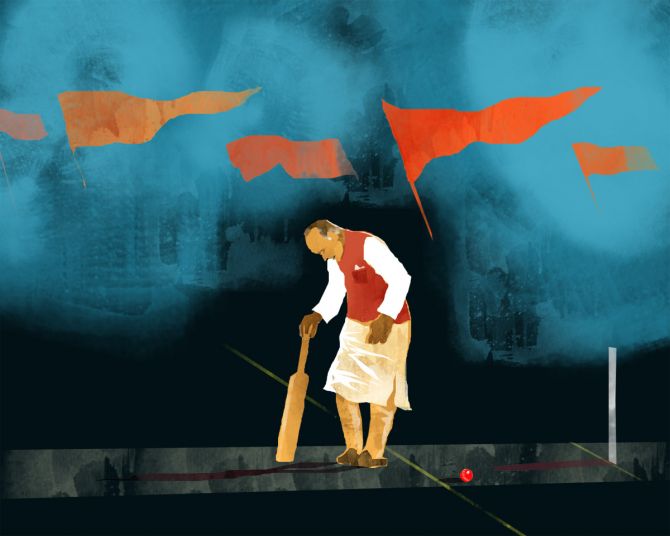Cricket has taken many steps forward towards excellence and fairness.
Electoral politics has a lot of catching up to do, points out Rajeev Bhargava.
An excerpt from his fascinating new book, Between Hope and Despair.

How important is it to win? It is pointless to ask this question in the context of competitive sports such as cricket or in electoral politics where one enters the fray in order to win.
But is winning the only point of these practices? Must we win at any cost?
Not Just about Winning
If the only purpose of playing cricket is to win, a quick and easy way is to have a five-over match.
A few athletes with muscle power but clueless about the art of bowling, batting and fielding would give you a win with their slap-dash cricket.
However, five-day matches are valued because the very best skills of the two contesting teams are expressed only in games of long duration.
A win without a proper contest between two highly skilled teams is deeply unsatisfying.
It takes the joy out of the game and brings little respect.
In short, an important purpose of playing cricket is achieving excellence and deriving aesthetic pleasure.
Equally important is to win the game fairly. Consider this.
A match is delicately poised when Sachin Tendulkar is wrapped on the pads off a ball clearly pitching outside the leg stump.
The entire Australian team appeal vociferously, the home crowd in Sydney roars and the umpire raises the dreaded finger.
A great batsman falls victim to a dubious decision and India loses the match.
The whole country feels bitter and the ties between the two teams, indeed two nations, get strained. This is not hypothetical.
Until the late eighties, Test matches were routinely dogged by controversy over home umpiring.
Not that umpires were necessarily biased, but on occasions, for instance, under pressure from the home team and the crowd, they were forced into wrong decisions.
Fairness in the game received a big boost when neutral umpires were introduced by the ICC to prevent endless carping, mutual distrust and recrimination.
From then on, there has been continuous effort on the part of the cricketing fraternity to check biases and minimise human error.
Match-fixing is severely punished.
Technology is used to strengthen impartial decisions: Snickometer, hotspot, ball tracking, zoom videography and reviews of umpiring decisions are now commonplace to prevent a cloud of suspicion over the winner.
Clearly, we play cricket to win, but (a) a slam-bang approach that does not test the full range of skills makes the win look worthless and (b) an unfairly achieved win is hollow.
Besides, fairness and excellence are linked. Generating conditions that suit a team can help it win a few matches at home, but soon enough, its weaknesses are exposed.
Flat-track bullies can score tons of runs at home but fail in seaming conditions.
A good team must learn to play under different conditions and resist the temptation to nudge the curator to doctor home pitches.
A team wins consistently and rises to the top only when its premier batsmen negotiate good quality spin and pace with equal ease, and such skills do not develop without 'fair pitches'.
In important ways, elections can be legitimately compared to competitive sports. Political parties enter the contest in order to win.

But the whole point of choosing political winners is lost if the electorate is unable to properly evaluate or assess the past or future performance of political parties.
In short, a major purpose of elections is to test the full range of skills of contesting political leaders their ability to efficiently deliver on promises, to build consensus among different groups, to be open to criticism and know that criticism is not tantamount to personal insult, to not conflate private interest with the common good, to be sincere and truthful, etc.
If elections cease to be an arena where political skills are publicly examined and assessed and are instead used by politicians by rhetorical flourish and spectacular demagoguery to hoodwink people into believing that they are the best, then, like wins in slam-bang limited-overs cricket, electoral victories become pointless.
This is not to say that rhetorical or communication skills are unimportant, but if they deflect from substantive issues of welfare or obstruct the assessment of the full range of political skills, democratic elections lose much of their point.
An election won by unfair means is even more vacuous.
Till the eighties, rigging and booth capturing were not uncommon.
But once the election commission acquired greater constitutional authority and autonomy, seat fixing became difficult.
Despite its flaws, the introduction of the electronic voting machine has further bolstered free and fair elections in India.
But much work still remains to be done. Why?
The Electoral Hotspot
Electoral victories are still marred by the subtle deployment of unfair tactics.
For instance, majoritarian pressure compels institutions such as the election commission to sidestep neutrality and overlook the violation of existing laws.
It is impermissible in India to seek votes by showing explicit or implicit hostility towards or excluding particular religious groups.
Why then did the EC fail to spot this in the 2017 assembly in Gujarat?
Second, some leaders of the BJP have distorted tactless remarks by politicians of other parties and mischievously given them a divisive and casteist twist to boost their party's electoral prospects.
The electoral hotspot -- our television cameras -- clearly showed the intent to mislead but our EC kept mum.
Our moral technology to detect and punish unfair electoral practice remains a distant dream.
Cricket has taken many steps forward towards excellence and fairness.
Electoral politics has a lot of catching up to do.
Excerpted from Between Hope and Despair, by Rajeev Bhargava, with the kind permission of its publishers, Bloomsbury.
Feature Presentation: Aslam Hunani/Rediff.com










